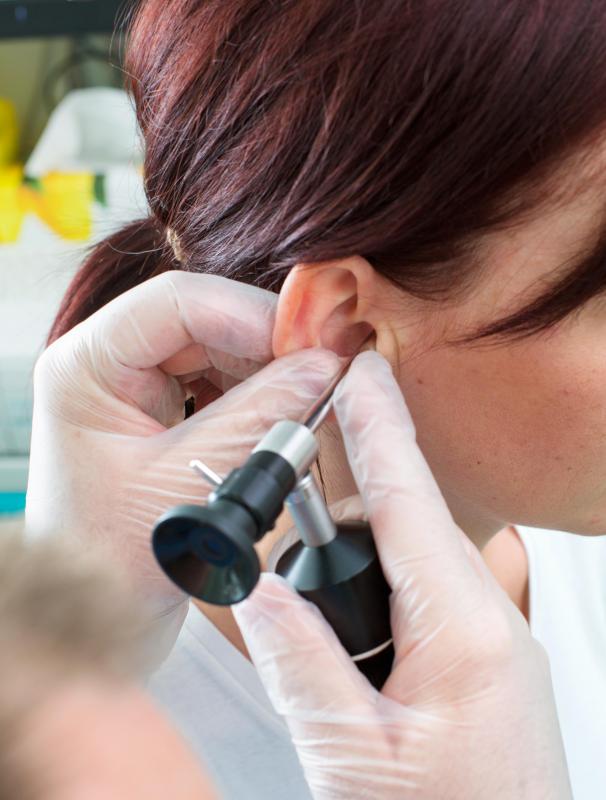At TheHealthBoard, we're committed to delivering accurate, trustworthy information. Our expert-authored content is rigorously fact-checked and sourced from credible authorities. Discover how we uphold the highest standards in providing you with reliable knowledge.
What is Sensorineural Hearing Loss?
Sensorineural hearing loss is a form of permanent hearing loss that originates with problems in the inner ear, the vestibulocochlear nerve, or the brain. There are several conditions which may contribute to the development of this progressive, irreversible form of hearing loss. Treatment for sensorineural hearing loss involves the use of either hearing devices or cochlear implants.
Also known as nerve deafness, sensorineural hearing loss may occur due to a variety of factors that adversely affect the proper functioning of the ear. In some cases, hearing may be permanently lost due to issues within the inner ear itself, such as a congenital defect, birth injury, or infection. Sensorineural hearing loss may also result from damage to the vestibulocochlear nerve or impaired sensory processing within the brain.

Nerve deafness is usually considered an idiopathic condition, meaning there is no single, identifiable cause for its development. Despite the absence of a single cause, there are several suspected factors which may contribute to the progression of hearing loss. Individuals who acquire a viral infection, such as rubella or herpes simplex, may develop complications which lead to the development of nerve deafness. Other conditions which may contribute to irreversible hearing loss include leukemia, scarlet fever, and autoimmune diseases, such as lupus. Individuals who sustain trauma to their inner ear or vestibulocochlear nerve, such as injury resulting from a skull fracture or a perforation of the eardrum, may be diagnosed with nerve deafness.

Symptoms associated with sensorineural hearing loss are dependent on the age of the individual and the extent of the hearing loss upon diagnosis. Infants with hearing loss may exhibit behavioral signs such as a lack of response to auditory stimuli or the absence of vocalization. Children with nerve deafness may be unable to hear higher pitched sounds or the sounds certain letters make, such as “S” or “Z.” Additional signs of sensorineural hearing loss include vertigo and a persistent ringing or buzzing in the ears, known as tinnitus.

A diagnosis of nerve deafness may be confirmed with a complete medical history and an ear examination. In some cases, imaging testing of the head may be performed, including a computerized tomography (CT) scan and magnetic resonance imaging (MRI). Hearing tests may also be administered to better evaluate the degree of hearing loss.
Treatment for sensorineural hearing loss may involve the use of a hearing device that fits just inside the ear. Most hearing devices, also known as hearing aids, are designed to be nearly cosmetically invisible. The device is outfitted with a small microphone used to amplify sounds and transmit them to the ear. A hearing device may be independently volume controlled to best suit individual purpose and need.

Cochlear implants are a prosthetic replacement for hearing and not considered a cure for hearing loss. As an aid for both hearing and speech, the implant allows the hearing-impaired individual a representation of sounds within his or her environment. Unlike a hearing device, a cochlear implant works by stimulating the auditory nerve.
Complex in its composition, a cochlear implant is comprised of a microphone, speech processor, transmitter, stimulator, and receiver. The internal portions of the implant consist of the stimulator and receiver, which are positioned within the cochlea and just beneath the skin behind the ear. The external portion of the device is comprised of the speech processor, microphone, and transmitter and is positioned behind the ear directly above the implanted receiver.

Following surgery, the individual may begin speech therapy and work closely with an audiologist and speech therapist. Prognosis associated with a cochlear implant is dependent on several factors, including the success of the surgery and how long the individual had been deaf or hearing impaired prior to surgery. Learning to interpret the sounds one hears and being able to process that information are essential to deriving the most benefit from the implant.
AS FEATURED ON:
AS FEATURED ON:















Discuss this Article
Post your comments